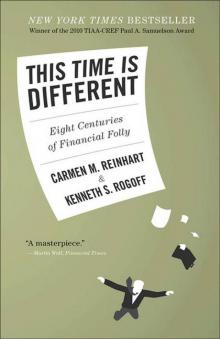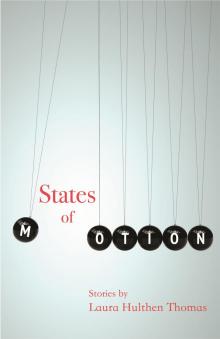This Time Is Different: Eight Centuries of Financial Folly


Author: Carmen M. Reinhart
Category: Other3
Published: 2009
Series:
View: 305
Read OnlineThroughout history, rich and poor countries alike have been lending, borrowing, crashing--and recovering--their way through an extraordinary range of financial crises. Each time, the experts have chimed, "this time is different"--claiming that the old rules of valuation no longer apply and that the new situation bears little similarity to past disasters. With this breakthrough study, leading economists Carmen Reinhart and Kenneth Rogoff definitively prove them wrong. Covering sixty-six countries across five continents, This Time Is Different presents a comprehensive look at the varieties of financial crises, and guides us through eight astonishing centuries of government defaults, banking panics, and inflationary spikes--from medieval currency debasements to today's subprime catastrophe. Carmen Reinhart and Kenneth Rogoff, leading economists whose work has been influential in the policy debate concerning the current financial crisis, provocatively argue that financial combustions are universal rites of passage for emerging and established market nations. The authors draw important lessons from history to show us how much--or how little--we have learned.Using clear, sharp analysis and comprehensive data, Reinhart and Rogoff document that financial fallouts occur in clusters and strike with surprisingly consistent frequency, duration, and ferocity. They examine the patterns of currency crashes, high and hyperinflation, and government defaults on international and domestic debts--as well as the cycles in housing and equity prices, capital flows, unemployment, and government revenues around these crises. While countries do weather their financial storms, Reinhart and Rogoff prove that short memories make it all too easy for crises to recur.An important book that will affect policy discussions for a long time to come, This Time Is Different exposes centuries of financial missteps.ReviewI would say that her [Carmen Reinhart's] book with Ken Rogoff on debt crises and financial crises is an extraordinary piece of work. (eral Reserve Chairman Ben Bernanke, speaking before the House Budget Committee (6/9/2010) )[E]ssential reading . . . both for its originality and for the sobering patterns of financial behaviour it reveals. (Economist )Reinhart and Rogoff have compiled an impressive database, which covers eight centuries of government debt defaults from around the world. They have also collected statistics on inflation rates from every country where information is available and on banking crises and international capital flows over the past couple of centuries. This lengthy historical study gives what they call a 'panoramic view' of the unending cycle of boom and bust, showing how claims that 'this time is different' are invariably proven wrong. . . . This Time Is Different doesn't simply explain what went wrong in our most recent crisis. This book also provides a roadmap of how things are likely to pan out in the years to come. . . . This Time Is Different is an important addition to the literature of financial history. (Edward Chancellor Wall Street Journal )Everyone working on economic policy should own This Time is Different and open it for a bracing blast of sobriety when things seem to be going well. (Greg Ip Washington Post )[A] terrific book. (Andrew Ross Sorkin New York Times )The authors use copious amounts of data . . . to make the compelling case that any well-informed person should have seen the Great Recession coming. The essence of their book is that while financial crises come in different varieties, they are not mysteriously born of undersea earthquakes, but frequently occurring events that can be spotted and even controlled if politicians and regulators know what to look for. (Devin Leonard New York Times )This Time is Different takes a Sergeant Friday, just-the-facts-ma'am approach: before we start theorizing, let's take a hard look at what history tells us. One side benefit of this approach is that the current book manages to be both extremely useful to professional economists and accessible to the intelligent lay reader. The Reinhart-Rogoff approach has already paid off handsomely in making sense of current events. (Robin Wells and Paul Krugman New York Review of Books )Among policy experts and economists, This Time is Different: Eight Centuries of Financial Folly . . . has become so influential that when somebody says, 'We live in a Reinhart-Rogoff world,' everybody else in the room nods sagely. (Justin Lahart Wall Street Journal )Professor Rogoff and his longtime collaborator Carmen Reinhart . . . know more about the history of financial crises than anyone alive. The pair have just published their broad survey of financial crises, This Time is Different. In an era when most 'analysts' rely on maybe 30 or 40 years' worth of financial history--and then only that of the U.S.--the authors' knowledge of financial crises and government bond defaults going back to the Spanish empire and before offers a richer perspective. (Brett Arends Wall Street Journal )[O]ne of the most important economic books of 2009. (Jon Hilsenrath Wall Street Journal )[T]he definitive book on financial crises. (Steven Pearlstein Washington Post )Two top-notch economists provide a clear and interesting explanation of why economic crises keep occurring. Broadly speaking, downturns such as the one we are recovering from are historically associated with characteristics that should sound quite familiar to today's investors. (David Schwartz, Financial Times )[A] masterpiece. (Martin Wolf Financial Times )The four most dangerous words in finance are 'this time is different.' Thanks to this masterpiece by Carmen Reinhart at the University of Maryland and Kenneth Rogoff of Harvard, no one can doubt this again. . . . The authors have put an immense amount of work into collecting the data financial institutions needed if they were to have any chance of making quantitative risk management work. (Martin Wolf Financial Times )Here's a deep and rewarding assignment for all of you, young and old, poor and rich, bullish and bearish. Retire to a quiet spot with a copy of This Time Is Different: Eight Centuries of Financial Folly, by Carmen M. Reinhart and Kenneth Rogoff. (Bob Lenzner Forbes.com )[A] fine new history of financial debacles. (Daniel Gross Newsweek )Wouldn't it be nice to have $1,000 for every time a pundit proclaims an era of endless prosperity, consigning booms and busts to the dumpster of history? The next time you hear that canard (and you will) pour yourself a single malt and dip into Carmen M. Reinhart and Kenneth S. Rogoff's landmark study, This Time Is Different. Wherever you open the book, you'll find proof that debt-fueled expansions have ended in financial ruin for hundreds of years. . . . The result is a visual history laid out in beguilingly simple graphs and tables, making the book both definitive--a must read for professors and investors--and accessible to a wider audience. (James Pressley Bloomberg News )Carmen Reinhart and Kenneth Rogoff have delivered a powerful and eloquent statement. . . . Reinhart and Rogoff have done an extraordinary job in putting together statistics on government debt--a task that economic historians should have done long ago but shied away from because of the difficulties of defining 'government', which is often complex and multi-layered. (Harold James The American Interest )Unlike prior narrative accounts of market panics from such finance writers as Charles Kindleberger and Edward Chancellor, Reinhart and Rogoff give us a data-driven study that is global in sweep but also a model of clarity. The authors package their notably nonhysterical analysis of the latest crisis in a large, self-contained section of the book inviting harried readers to skip right ahead to it. (Daniel Akst CNNMoney.com )A tour de force of quantitative analysis covering financial crises affecting 66 countries over the past 800 years, the book identifies pre-crisis patterns that recur with eerie consistency. This Time is Different is a must-read for anyone on the lookout for canaries in coal mines. (Barron's )This is certainly one of the must-read books of the year. (Arnold Kling Econlog.com )Rogoff and Reinhart . . . provide an eye-opening look at the cycles of boom and bust and how governments deal with those cycles. (Arkansas Business )[A] valuable new book. (Idaho Statesman )Having studied mountains of economic data during the past eight centuries, the authors insightfully point out the highly repetitive nature of financial crises resulted from a dangerous mix of hubris, euphoria and amnesia. (Shanghai Daily )This Time is Different . . . is an unusually powerful bull detector designed to protect investors and taxpayers alike--eventually, at least, and provided the spirit is willing. . . . The book's most memorable passages--what the authors call its 'core life'--are to be found not in colorful stories about long-ago personalities, but rather in its various tables and figures. They take some time to comprehend, but any responsible citizen can and ought to consider they evidence they present. It is overwhelming. (David Warsh Harvard Magazine )Financial folly, economists Carmen Reinhart and Kenneth Rogoff show in this groundbreaking book, knows no boundaries and has no expiration date. . . . For a book built around numbers, This Time is Different makes for surprisingly good reading. The authors are well aware that human nature is at the heart of the disasters they document, and they enliven the text with brief and amusing accounts of charlatans and cheats. (Paul Wiseman USA Today )The credit crunch of 2007 became the financial crash of 2008 and the recession of 2009. But there has been much debate about the scale of this crisis, and how it ranks against previous events. Reinhart and Rogoff have produced the most detailed study yet of financial crises, going back as far as 12th-century China. . . . [This Time is Different] will be a vital source of reference in debates on the causes and consequences of financial crises. By cataloguing so thoroughly every known instance of financial crisis, it performs a significant service and opens up new lines of inquiry. (Andrew Gamble New Statesman )[T]his is the kind of economics we desperately need, as it is relevant, fact-based and replete with wisdom from the past--and lessons for the future. (Irish Times )For those who want to relearn the forgotten lessons of the past, This Time is Different, by economics professors Carmen Reinhart and Kenneth Rogoff, is an excellent place to start. . . . These are lessons worth learning. (Liaquat Ahamed National Interest )This book's distinctive strength is that it's built around a massive international database going back as far as twelfth-century China and medieval Europe. (Harvard Business Review )[S]uperb. (Neil Reynolds Globe & Mail )Reinhart and Rogoff have compiled an encyclopedic analysis of the history of financial crises over the last 750 years. But their volume is not merely of historical interest. Rather, it has great relevance for anyone interested in understanding how the current financial crisis is likely to unfold. (Choice )Reinhart and Rogoff present a sobering reminder that financial crises are a serial phenomenon--caused in no small part by the seductive 'this-time-is-different syndrome,' the prevalent belief that to us, here and now, old economic laws of motion no longer apply. Their ambitious quantitative history of financial crises draws out sweeping parallels between financial crises, across times and continents; and between inflating away domestic debt, currency debasements, and defaults on external debt. (Finance & Development )[I]nstant classic tome on debt crises. (Alen Mattich Dow Jones Newswires )[A]wesome. (William Easterly AidWatch )One book in particular has been circulating among economists and market insiders. This Time is Different analyzes vast amounts of historical data on financial debacles, including state failures around the world, bank crises, currency woes and high inflation. The title satirizes those who fail to learn from past blunders and repeat them while insisting, 'This time is different.' (Hideo Tsuchiya Nikkei Weekly )Reinhart and Rogoff have produced a splendid book detailing the massive self-destructive behavior that all states have been undergoing over the past several centuries. . . . Reading this excellent book on the paths of previous economic cycles could help avoid some of the worst results of our self-destructive financial acts. (Lloyd Demause Journal of Psychohistory )Anyone looking for a more academic take on where this meltdown places in the history of financial folly should turn to This Time is Different, a magisterial work on the causes and consequences of crises stretching back 800 years. (Matthew Valencia Economist.com )I couldn't put it down until I had gone all the way through it, and then I immediately ordered it as an assigned text for my Spring 2010 MBA course, 'The Development of Financial Institutions and Markets.' My students are finding it useful and engaging. (Richard Sylla EH.Net )Easily the most useful, and arguably the best, is this splendid piece of research and analysis on, as the subtitle says, 800 years' worth of booms and busts. (Bill Emmott Survival )This Time Is Different changes the way we can study financial crises. It is the start of a truly comprehensive approach to the subject. . . . It adds new ideas that will be useful for gauging the risk of future crises and perhaps even reducing their impact, if investors and policymakers are willing to learn from other people's mistakes, not just their own mistakes. (Kurt Schuler CATO Journal )[T]he book will be essential reading for anyone who wants to put the recent crisis into some historical perspective--and get some ideas on how to prevent, or at least delay, the next one. (David Orrell Foresight )It's the only book I have seen that provides, with great detail and over 800 years, clearly defined, analytical, data-driven evidence of what the impact of a post-financial crisis period is and hence what we can anticipate. . . . I've never seen anything that comes close in terms of being comprehensive. It's a tour de force. (Dambisa Moyo The Browser )[T]his Time is Different [is a] landmark work on financial crises . . . (Megan McArdle TheAtlantic.com )Readable, shocking, and vital, this is a book that every investor who has been tempted by a hefty interest rate in a faraway land should study. (Andrew Allentuck National Post )[This Time is Different] is perhaps the finest study of financial crises ever published. (Ezra Klein Washington Post )[A] modern classic. . . . In their landmark study of hundreds of financial crises in 66 countries over 800 years, Reinhart and Rogoff find oft-repeated patterns that ought to alert economists when trouble is on the way. One thing stops them waking up in time: their perpetual belief that 'this time is different.' (Ross Gittins Sydney Morning Herald )[S]eminal . . . (Rana Faroohar and Bill Saporito Time ) From the Inside Flap"A classic."--Nouriel Roubini"This is quite simply the best empirical investigation of financial crises ever published. Covering hundreds of years and bringing together a dizzying array of data, Reinhart and Rogoff have made a truly heroic contribution to financial history. This single marvelous volume is worth a thousand mathematical models."--Niall Ferguson, author of The Ascent of Money: A Financial History of the World"This Time is Different is terrific, for it gives just the perspective we need on the current world economic crisis. People can't expect to understand the current crisis without some in-depth look at past crises. That is exactly what this excellent and timely book provides."--Robert J. Shiller, author of Irrational Exuberance and coauthor of Animal Spirits"You will be hard-pressed to find a more comprehensive and insightful analysis of financial crises. Reinhart and Rogoff's superb book is a must-read for anyone looking to understand past and present crises, as well as navigate those of tomorrow."--Mohamed El-Erian, author of When Markets Collide"This Time Is Different is a tremendously exciting, topical, and controversial book on the history of debt and default. This one belongs on everyone's shelf."--Barry Eichengreen, author of The European Economy since 1945
 Midnight Crossing: A Mystery
Midnight Crossing: A Mystery Should Have Known Better
Should Have Known Better The Art of Hiding
The Art of Hiding States of Motion
States of Motion A Thousand Lives
A Thousand Lives Death Prophets
Death Prophets Playing Around
Playing Around Shattered Perfection (The Perfection Series Book 1)
Shattered Perfection (The Perfection Series Book 1)